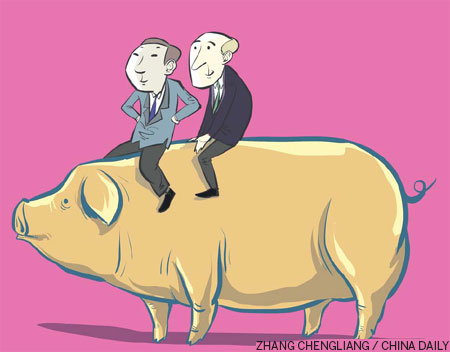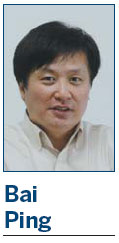Pork firm deal to help restore consumer trust
Updated: 2013-06-21 08:58
By Bai Ping (China Daily)
|
|||||||||||


Fraudulent practices, not low tech, to blame for food safety fears
My family has started buying Shuanghui products again after the largest Chinese pork producer announced a bid to acquire US pork giant Smithfield three weeks ago. It was not an easy decision because we had shunned Shuanghui sausages and ham for years after it was reported to have sold pork from pigs that had been fed banned additives, which made the pigs leaner but posed a health risk to humans.
Like many other Chinese consumers who live in constant fear of food contamination, we have developed our own safety rules while shopping for meat: We don't buy a brand that has been recently involved in a food safety scandal and we avoid cheap, mass-market products because of concerns that the producers may have cut corners to control costs. Unfortunately, Shuanghui fits both.
But we have decided to give Shuanghui a second chance since it is associating with a foreign pork producer that has a reputation for maintaining high quality. We hope the acquisition plan has prompted the company to conform to international standards and rules, as it has denied any intention of changing Smithfield's practices and wants the business "to stay the same but better".
Perhaps Shuanghui will also bring in American expertise and technology to overhaul China's pig farming sector. But more than anything else, shoppers will value its potential to adopt more responsible practices to protect consumers. The reason is simple: fraudulent business practices, rather than low technology, are to blame for most of the notorious food scandals, ranging from contaminated milk powder to the selling of rat meat as lamb, in recent times.
Before the takeover bid, Shuanghui, which is known in China for the "lean pig additives" scandal, claimed to have spent billions of yuan on importing thousands of pieces of advanced slaughtering and processing equipment from the United States and Europe.
Shuanghui is not the first Chinese food company to invest overseas. China's dairy product makers, with a tattered reputation for low quality, have already set up joint ventures overseas. Perhaps high production costs and scarce land supply at home are also factors why they are looking abroad for better prospects. But being associated with established foreign brands is the fastest way to win back consumers.
Amid the growing skepticism of domestic food producers, Chinese people have tried various ways to reduce the risks of consuming contaminated or substandard food products, such as buying more imported food and getting personally involved in food production to ensure quality.
A series of tainted milk scandals in recent years has triggered runs on baby formulas in overseas supermarkets, as panicky parents try to keep their babies away from domestic brands. In big cities like Beijing, middle-class residents, worried about toxic soil and pesticides in vegetables, have hired farmers to grow organic produce in suburban areas.
Until recently, I had flown regularly overseas to buy baby formula for my son from supermarkets or pharmacies. I have also tried roof gardening to grow some organic vegetables for my family. Such efforts at safe eating have proved to be expensive, time-consuming and sometimes humiliating, because we often attracted resentful stares during overseas trips to buy baby formula for helping create shortages in the local market.
Perhaps food safety will improve in the future because there is a more forceful call from the public for the government and producers both to ensure food quality. The fact that major pork, milk and other food producers are embracing international standards while going global, also promises a higher quality as well as greater transparency in their operations and products.
But what will happen if the Shuanghui deal falls through? Here is the final rule for safe eating at a time when consumer confidence in meat is weak everywhere: We should rotate even the brands we trust and never stick to one for too long.
The author is editor-at-large of China Daily. Contact the writer at dr.baiping@chinadaily.com.cn.
(China Daily European Weekly 06/21/2013 page13)
Today's Top News
List of approved GM food clarified
ID checks for express deliveries in Guangdong
Govt to expand elderly care
University asks freshmen to sign suicide disclaimer
Tibet gears up for new climbing season
Media asked to promote Sino-Indian ties
Shots fired at Washington Navy Yard
Minimum growth rate set at 7%
Hot Topics
Lunar probe , China growth forecasts, Emission rules get tougher, China seen through 'colored lens', International board,
Editor's Picks

|

|

|

|

|

|





